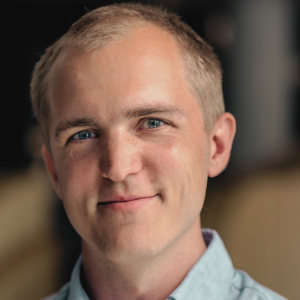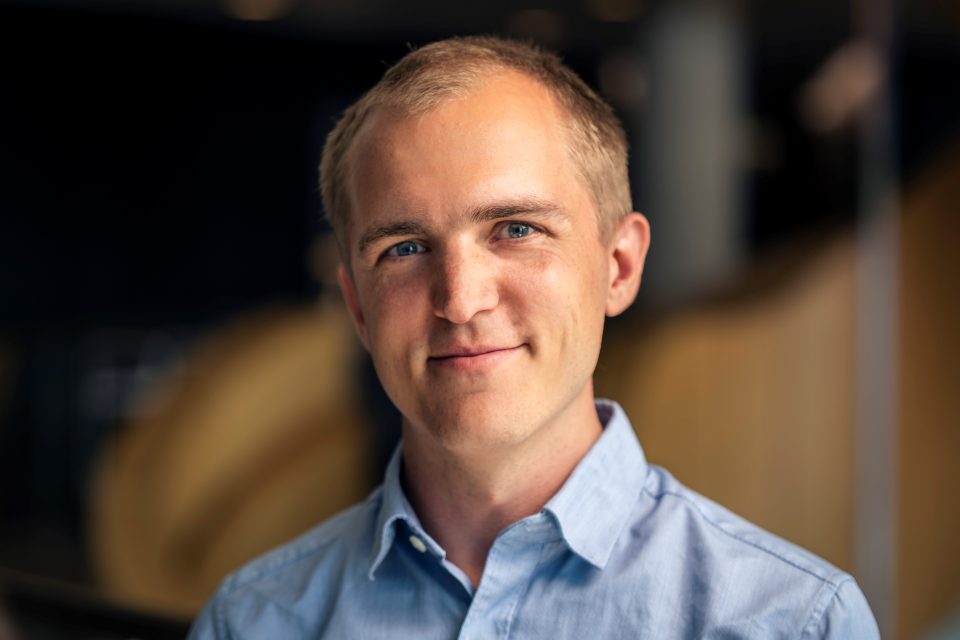15 December 2023
Assistant Professor Terkild Brink Buus from the LEO Foundation Skin Immunology Research Center at the Department of Immunology & Microbiology, University of Copenhagen, is among the three talented skin researchers who are the first to receive a LEO Foundation Dr Abildgaard Fellowship of DKK 12 million.
The LEO Foundation Dr Abildgaard Fellowships are a new LEO Foundation grant instrument – each fellowship worth DKK 12 million for a five-year period – established in 2023 to support skin research talents who have the ambition to establish or expand an independent research group at a not-for-profit Danish research institution, and who are also starting their careers as research leaders.
Assistant Professor Terkild Brink Buus – from the LEO Foundation Skin Immunology Research Center at the Department of Immunology & Microbiology (ISIM), University of Copenhagen – receives the fellowship for his proposed research program on increasing our understanding of how bacteria and their toxins affect the skin and worsen symptoms of atopic dermatitis, commonly known as eczema, in patients. With this five-year research grant, Terkild Brink Buus will be able to establish a research group at the University of Copenhagen and develop his role a research leader.
Terkild Brink Buus receives a LEO Foundation Dr Abildgaard Fellowship through the 2023 research theme, Skin Immunology and Inflammatory Skin Diseases.
Terkild Brink Buus
Assistant Professor, University of Copenhagen, LEO Foundation Skin Immunology Research Center, Denmark, DKK 12m

Project title: Staphylococcus aureus drives inflammation and disease activity in atopic dermatitis – novel approaches to old problems
Fellowship theme: Skin Immunology and Inflammatory Skin Diseases
Terkild Brink Buus’ vision is to develop better strategies to manage atopic dermatitis (AD) and improve patient lives by increasing our understanding and providing vital insights into the underlying biology. AD is a debilitating disease affecting more than 30% of Danish children at great cost to patients, parents, and society.
Terkild Brink Buus’ project addresses the role of bacteria and their toxins in causing severe worsening of the AD. Building on his expertise in complex data analysis and research on aberrant T cells and skin inflammation, Terkild Brink Buus will explore how T cells – a vital part of our immune system – are hijacked by bacterial toxins to aggravate AD and how this can be counteracted by novel treatments.
Terkild Brink Buus hopes to increase our understanding of how bacteria and their toxins affect the skin and worsen the symptoms of AD patients. His research will provide the basis for initiating clinical trials of new treatment approaches targeting bacteria in AD patients as well as guidelines for how to determine which patients are most likely to benefit. Finally, he will provide several novel laboratory and analytical techniques that will be of high value to future research within inflammatory skin diseases.
An emerging research leader decoding eczema
Terkild Brink Buus is an Assistant Professor at the LEO Foundation Skin Immunology Research Center (SIC) under the Department of Immunology & Microbiology (ISIM) at the University of Copenhagen, Denmark – where he has been a researcher affiliated with an existing SIC research group. With the grant from the LEO Foundation, however, Terkild Brink Buus will now establish his own research group, targeting his ambitions within skin research – and extending upon the attributes of the center.
Terkild Brink Buus expresses his high hopes and expectations for the impact of the LEO Foundation Dr Abildgaard Fellowship on his work.
“The LEO Foundation Dr Abildgaard Fellowship provides a robust platform for me to establish and lead my own research group at the LEO Foundation Skin Immunology Research Center. It grants me the opportunity to fully delve into my research interests, lead a team, and make meaningful contributions to the scientific community as an independent investigator. Ultimately, this fellowship paves the way for my long-term aspiration to become a leader in the field of skin immunology research,“ he says.
Terkild Brink Buus’ research dives into the mysteries of atopic dermatitis, a common skin condition particularly in children, and focuses on understanding how bacteria can hijack T cells, a vital part of our immune system, to make the skin disease worse.
“We are exploring innovative ways to combat these harmful bacteria, without relying on traditional antibiotics. Our aim is to develop advanced tools that will enable us, and the broader scientific community, to study skin diseases in new ways with an unprecedented level of detail, offering a clearer picture of what is happening in the skin and how we can improve treatments.”
To do so, he will conduct research building on his expertise in complex data analysis and research on aberrant T cells and skin inflammation, hoping to uncover how bacteria aggravate skin inflammation to provide guidance on how patients may benefit from new therapies.
An innovative researcher confident in combining methods
During the LEO Foundation Dr Abildgaard Fellowships’ review process, Terkild Brink Buus highly impressed reviewers with his comprehensive and highly ambitious research approach, as well as unusual and unique combination of skills in T cell wet lab work and computational biology,
“As a group leader, my central focus is on driving scientific advancement and innovation. I am deeply passionate about pushing the boundaries of our knowledge, and I am constantly seeking breakthroughs in both treatments and research methodologies. I believe in fostering an environment that encourages creativity and exploration, which leads to new insights that can benefit the broader scientific community. Ultimately, my goal is to translate these innovations into tangible differences in the lives of patients, ensuring that our work has a meaningful and lasting impact.”
Making a difference in patients’ lives
Terkild Brink Buus envisions a future where his research makes a positive impact on patients’ lives and contributes to progress within the scientific community.
“With our research, we aim to make a meaningful impact on the lives of those affected by eczema and other inflammatory skin conditions. By unraveling the role of bacteria and how they can hijack our immune system, we hope to contribute vital insights that lead to improved strategies for managing the conditions, ultimately improving lives. Additionally, the advanced tools we plan to develop are envisioned not only to advance our understanding of skin immunology, but also to become valuable resources for the broader scientific community.“
Desired outcomes from Terkild Brink Buus’ work include providing a basis for initiating clinical trials of new treatment approaches targeting bacteria in atopic dermatitis patients. He also hopes to provide guidelines for such treatments, to determine which patients might be most likely to benefit from them – hereby personalizing treatment.
Furthermore, he aims to provide several novel laboratory and analytical techniques that will be of high value to future research within inflammatory skin diseases. These technologies will be made available to and be usable by other researchers – in this way benefiting the community.
In 2023, three talented skin scientists received a LEO Foundation Dr Abildgaard Fellowship. Discover more about the grantees and details of these fellowships here.
About LEO Foundation Dr Abildgaard Fellowships
The LEO Foundation Dr Abildgaard Fellowships program aims to support talented, emerging research leaders, both Danish and international, with ambitions to establish or expand an independent research group at a not-for-profit Danish research institution, and to pursue novel and important research questions within skin and skin diseases.
The LEO Foundation Dr Abildgaard Fellowship program is thematic and is announced once a year in open competition. Grants of DKK 12 million are awarded for a five-year period.
In 2024 the application deadline is 17 April (16:00 CEST). Applicants can apply within one of the two themes, Advanced Therapeutics Research in Skin Diseases and Systems Medicine in Dermatology. Read more about the program and eligibility criteria here.
About the LEO Foundation
The LEO Foundation is one of the largest private funders globally of independent skin research. The Foundation provides philanthropic grants with the aim to support the best international research in skin diseases and make Denmark a global beacon for skin research. Over the past decade, the LEO Foundation has given more than DKK 1 billion in grants and awards to independent skin – in Denmark and all over the world.
